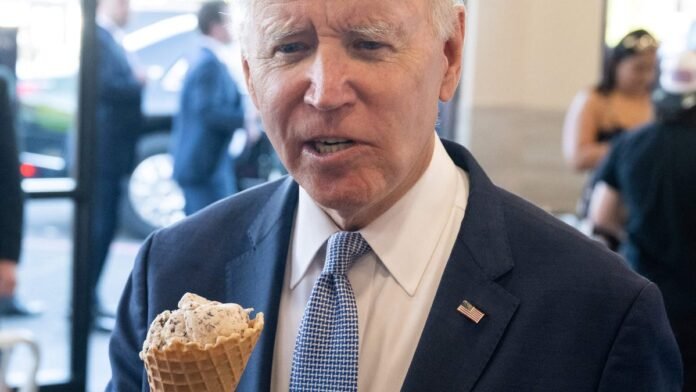White House ice cream history is more than a tale of dessert – it’s a reflection of American ingenuity.

National Ice Cream Day: How to celebrate
Celebrate National Ice Cream Day with this delicious magic shell recipe.
Problem Solved
- Ice cream has been a beloved treat in the White House, enjoyed by presidents and guests for centuries.
- From Thomas Jefferson’s icehouse to Ronald Reagan’s proclamation of National Ice Cream Month, presidents have embraced ice cream.
- Even presidents known for their seriousness, like Calvin Coolidge, have been captured enjoying ice cream.
- The tradition of ice cream in the White House reflects American culture and the simple pleasure of a sweet treat.
Picture this: a swelteringly unbearable Washington, DC summer. Now imagine stepping into the White House, where a cool scoop of ice cream awaits. For centuries, this frozen delight has been a staple in the Executive Mansion, charming presidents, first ladies, and guests alike.
From Thomas Jefferson to Donald Trump, ice cream has dripped deeply into the fabric of the White House and presidential history, proving that even the most powerful people in the world can’t resist a good scoop.
Though ice cream’s origins trace back to the second century B.C., it’s as American as apple pie. Today, we devour an average of 4 gallons per person each year. In the White House, it’s a treat that transcends politics and brings a touch of joy to formal state dinners and intimate garden parties alike.
And that’s not to mention first families or visiting grandchildren!
Ice cream is a great White House tradition
The story of ice cream in the White House begins with Thomas Jefferson, a man whose affinity for the frozen dessert began during his time in France. In 1806, Jefferson served ice cream at a White House Independence Day celebration, delighting guests with its cold, creamy texture – a rarity in the days before home refrigerators. Jefferson, whose menus sometimes even featured the treat served inside a warm pastry, had an icehouse built on the White House grounds to make sure ice cream was never in short supply.
Dolley Madison also embraced the dessert with enthusiasm, serving it frequently during her time as first lady from 1809 to 1817. While she wasn’t the first, she helped solidify ice cream’s place as a White House tradition.
Decades later, at Abraham Lincoln’s second inauguration ball in 1865, flavors ran the gamut as guests enjoyed an elegant buffet that included vanilla, lemon, white coffee, chocolate, burnt almonds, and maraschino ice creams alongside other desserts. The crowd left little behind, proving that ice cream could take the cake even amid national turmoil.
By the 20th century, ice cream was a White House summer staple, as evidenced by a charming moment in 1924 when President Calvin Coolidge and first lady Grace Coolidge enjoyed scoops at a garden party for veterans. The image of the famously reserved Coolidge indulging in ice cream humanized a president known for his stoicism.
President Reagan proclaimed July as National Ice Cream Month
The establishment of the White House executive pastry chef position in 1979 marked a new era of creativity for frozen desserts.
Roland Mesnier, who held the role from 1979 to 2004, often used sorbet – an ice cream-like dessert traditionally made with sugar, fruit juice or puree and water instead of dairy – in his elaborate final courses. For a 1984 state dinner honoring President Miguel de la Madrid of Mexico, Mesnier formed kiwi sorbet into cactus shapes filled with tequila-flavored mousse and adorned with pulled-sugar flowers and spines. A decade later, chef Mesnier went the full “cream” route in his dessert at a 1995 state dinner honoring German Chancellor Helmut Kohl, serving coffee and hazelnut ice cream.
President Ronald Reagan, known for his love of jelly beans, also had a soft spot for ice cream. In 1984, he proclaimed July as National Ice Cream Month and the third Sunday of the month as National Ice Cream Day – a “sundae” celebration.
Barack Obama brought a scooper’s perspective to the ice cream narrative. As a teenager in Honolulu, he worked at a Baskin-Robbins. In a 2016 LinkedIn post, the president reflected on the job’s lessons in responsibility and hard work, though admitting the endless free scoops somewhat but not completely dulled his taste for the treat.
There was no shortage of ice cream devotees at the White House, though. At a 2010 visit to an ice cream factory in Columbus, Ohio, the then-vice president proclaimed, “My name is Joe Biden, and I love ice cream. You all think I’m kidding – I’m not. I eat more ice cream than three other people … all at once.”
Donald Trump’s ice cream preference made headlines in 2017. As TIME magazine reported after a small Blue Room dinner for reporters during this first term, President Trump was served two scoops of vanilla ice cream with his chocolate cream pie, while his guests received just one. Whether intentional or not, the president’s double scoop added a modern twist to the mansion’s ice cream lore.
White House ice cream history is more than a tale of dessert – it’s a reflection of American tastes, ingenuity, and the human need for a little sweetness amid the pressures of leadership. During this National Ice Cream Month, the White House Historical Association will offer our own selection of ice cream delectables daily outside The People’s House, our new education center across from the White House Grounds. Stop by and have a scoop with us!
Stewart D. McLaurin is president of the White House Historical Association, a private nonprofit, nonpartisan organization founded by first lady Jacqueline Kennedy in 1961, and is director of The People’s House: A White House Experience multimedia educational center and museum.
